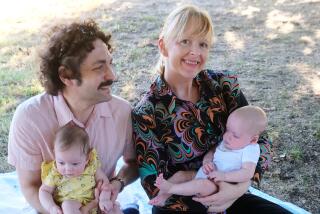The Word Heard ‘Round the World
- Share via
A vision of translating the Bible took hold of salesman William Cameron Townsend of Santa Ana in 1917. He had just arrived in Guatemala, and the Mayan groups he had hoped to reach had little use for his wares: Spanish-language Bibles.
His epiphany is said to have come with a question posed by a potential customer: “If your God is so great, why doesn’t he speak our language?”
Townsend, an amateur at linguistics, set out to put the Cakchiquel language of Guatemala into writing. He had taken on an enormously difficult task--from learning the complex language to adapting it to the Roman alphabet.
Fourteen years later, at First Presbyterian Church in Santa Ana, Townsend dedicated the first New Testament written in Cakchiquel. Today, 13 years after Townsend’s death, his vision of making the Bible accessible in a multitude of languages continues. This summer, the organization he founded dedicated its 400th New Testament translation--this one in the Barai language of Papua New Guinea.
From its U.S. headquarters in Huntington Beach, Wycliffe Bible Translators has more than 5,000 translators and support personnel at work in 51 countries. Supported by donations, it is by far the largest linguistic enterprise in existence, secular or religious, with total project funding topping $100 million a year. The mass of data accumulated by Wycliffe translators has become a vital resource for university linguists.
Founded by Townsend in 1934, the organization takes its name from 14th-Century theologian John Wycliffe, who had encouraged his followers to translate the Bible into English for the first time, an act that challenged the authority of the Roman Catholic Church and served as inspiration to other reformers.
Today, the organization that bears his name has completed New Testament translations in languages ranging from Apalia (in Brazil) to Zia (in Papua New Guinea), and is at work on more than 1,000 other tongues.
“Wycliffe made it their business to work with the groups that have been neglected” by other Bible-translating groups, said Bob Coote of the Overseas Ministry Study Center in New Haven, Conn. “That is something that has made them very distinct.”
Along with such successes, however, has come a measure of sometimes heated controversy, which began in Townsend’s day and continues to the present. Anthropologists and rights groups have said the group imposes its values on peoples with valid belief systems of their own, while a book published this year accuses Townsend of working in collusion with oil companies and U.S. government interests in South America.
Wycliffe administers most of its far-flung operations from an unassuming office block on Beach Boulevard.
“Nobody has the foggiest notion of what we do here,” joked Arthur Lightbody, a Wycliffe spokesman.
Officially, Wycliffe is a fund-raising and support organization, while the Summer Institute of Linguistics is the name under which field projects are conducted. All institute members are also Wycliffe members, however.
In Huntington Beach, a staff of more than 200 works to ensure that money and other resources reach translators and others in the field. There are video and radio production facilities here, a newsletter-publishing staff, accountants tabulating checks that flow in daily from donors, and administrators mapping out new strategies to achieve an old goal.
“What we want to do is get the Bible in every language,” Lightbody said. “What Uncle Cam”--as Townsend is called here even by those who never knew him--”talked about is what we still want to do.”
In a small auditorium, a tour stop for supporters and potential supporters who visit the offices, a short video explains the organization and its mission. “Be sure the Word gets in their hands,” a narrator pleads.
*
Wycliffe linguists now count more than 6,000 languages in the world, and estimate that there are 700 million people without Christian Scripture in their language.
Most of the translators sent into the field (many are husband-and-wife teams) have advanced degrees. Norm Purvis, a literacy worker in the Philippines who now works in administration in Huntington Beach, said Wycliffe is not so much a missionary organization as a “scientific organization made up of Christians.”
The work they produce is used by universities across the country; a handful of schools, in fact, have direct ties to the Summer Institute of Linguistics, notably the University of Texas at Arlington and several theological institutions, including Biola University in La Mirada and Fuller Theological Seminary in Pasadena.
Translators in the field are equipped with laptop computers, powered by solar-charged car batteries. Later this year, Wycliffe will unveil a new, highly sophisticated CD-ROM-based computer translation program--the culmination of a five-year effort--that has raised interest throughout the linguistic community.
Technology is not the only thing that has changed dramatically for Wycliffe translators--so have many of the remote places in which they work.
Deforestation and road construction are making many small language groups less isolated than they once were. Lightbody remembers that when he first went to the Philippines in the early ‘70s, he could fly for 45 minutes or more over unbroken forest; today, as much as 90% of the original forest cover is gone.
Still, even with technological breakthroughs and the world’s changing landscape, translation is arduous, isolated labor. A New Testament translation can take as long as 20 years of almost unbroken work.
Health problems are a hazard. And there are rare but real political dangers as well. In 1981, in a widely publicized case, translator Charles Bitterman was killed by Colombian rebels who accused the Summer Institute of Linguistics of having ties to the CIA. Ray Rising, another Wycliffe translator, has been held captive by an undetermined group in Colombia since March 31, 1994.
*
Although Wycliffe and the Summer Institute of Linguistics are officially nondenominational, they are most closely associated with evangelical Protestantism. Wycliffe members, however, do not take part in some of the activities normally associated with missionaries. They do not sermonize or baptize. They do not establish a church, although they encourage the people they work with to do so. Wycliffe’s primary tasks are to leave a people with a New Testament in their language and to do enough literacy work to ensure a critical mass of readers.
Basic literacy work has always been part of the equation. Linguists in the field translate health and agricultural materials as a way of disseminating vital information and of building local literacy.
Such efforts form an increasingly important component of Wycliffe’s work overseas. Some areas that would not otherwise allow large-scale Christian missionary activity now welcome--even invite--institute projects that emphasize linguistic and literacy work over Bible translation.
In Indonesia, which is 80% Muslim, the Summer Institute of Linguistics is conducting 54 active projects, with 160 personnel ranging from translators to pilots and mechanics. “All of us are there with a Christian motivation,” said Larry Jones, director of institute operations in Indonesia. But, he added, “we are working in Indonesia as a development group.”
All the areas in which they work have some degree of Christian presence, and institute linguists will translate the Bible “if asked,” Jones said. But literacy work and other community development is the main order of business, Jones maintained, and services are offered to all, regardless of beliefs.
*
In the Huntington Beach offices of Wycliffe USA, there is constant discussion on how to remain vital in this turbulent age.
In one office, Kiho Kim coordinates a fledgling effort to reach into the Korean community of the United States, both for financial support and for potential translators. There are, Kim said, about 870 Korean churches in Southern California and almost 4,000 across the United States.
A Wycliffe department called the Seed Co. is another experimental effort, now in its fourth year. It solicits support in the United States for locally based Bible-translation projects throughout the world.
“Most Bible translation until now has been done by expatriates,” said Bernie May, who heads the Seed Co.
Increasingly, he added, Third World nationals are showing “an ability and a desire to do it themselves. . . . You have some talented people, but they don’t have the money or the technical support to do it themselves.”
The Seed Co. provides both for selected projects. Wycliffe member Bill Wells, who this summer spent four weeks visiting Seed Co. projects in Africa, used Nigeria as an example of the opportunities. The nation has many educated people who have a desire to translate the Bible into some of the 400 distinct languages there, Wells said.
“The missing piece is money. This is the equivalent of venture capital,” he said. “We’re trying to figure out how to work with Christian associates in other countries.”
Such efforts, it is hoped by Wycliffe, will tap a willing pool of talent while lending an added legitimacy to translation efforts. At the same time, it addresses a nagging problem: a shrinking pool of U.S. citizens willing to devote decades to missionary work.
While Wycliffe has some short-term members, mostly for literacy work or teaching in missionary schools, it depends on long-term commitments for its core translation work. These translators must also raise their own financial support, primarily by securing support from churches.
“Anecdotal evidence would indicate the typical period of service is eight to 10 years, compared to 25 to 30 years a generation ago,” said Bob Coote of the Overseas Ministry Study Center.
Wycliffe is working on ways to get the attention of young Christians who may decide someday to commit to long-term fieldwork. For example, Crystal Lewis, a popular contemporary Christian singer, recently performed a series of concerts in support of Wycliffe.
“It’s a real challenge to get the Word to the younger generation,” Lightbody said.
The goal, he said, is to keep the Wycliffe project going until it is no longer needed--until all people have access to the Bible in their language, or in a language they understand.
Already, Wycliffe operations are winding down in the Amazon, once the group’s primary focus. Translators have closed shop in Bolivia and Ecuador.
“The idea,” Lightbody said, smiling, “is to work ourselves out of a job.”
More to Read
Sign up for Essential California
The most important California stories and recommendations in your inbox every morning.
You may occasionally receive promotional content from the Los Angeles Times.













